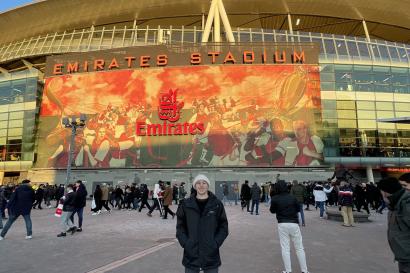“Hello?” says the man sitting across from me on the Luas headed toward St. Stephen’s. It is just past noon. “What’s the craic?”
/
“Cheers,” says the cashier at the grocery store. The word is bright, but her tone is mostly apathetic.
“Thanks,” I say, taking the receipt. She doesn’t give me a plastic bag for my tomatoes, and I know better now than to ask.
/
The teacher in my short story class is trying to give us a crash course in James Joyce’s Ulysses – a perhaps impossible task, given that the book is a good twenty centimeters thick. Or something. I’m still not so good with the metric system.
We read a line, and someone in the class points out how brilliant the alliteration is. One lines goes, “He watched the bristles shining wirily in the weak light as she tipped three times and licked lightly.”
“It’s even better,” the kid says, “in a Dublin accent. Because ‘three’ is ‘tree,’ right?”
The teacher pauses, possibly unsure whether Joyce intended this or not. But he does admit that his own ‘th’s sound like ‘t’s. “I’m always confusing students,” he says. “‘Things happen in trees? What the hell is he talking about, like monkeys?’”
/
“There are people who would chop off their legs for an American accent,” Cece says. She is sitting in the corner of the news office at Dublin South FM, typing at a keyboard. Her own English still bears traces of the place she grew up, South Africa, a country far distant from and far warmer than here. She likes to tease me for the frequency at which I say “like.” She says I say it a lot. I say she is prone to exaggeration.
Like, you know, now.
Craig looks up, incredulous. He’s a big guy, with dark hair. He does something in I.T., although I haven’t figured out exactly what yet. “No one,” he says, with a sort of emphatic dignity, “would ever chop off their legs for an American accent.”
/
“Jaysus,” someone says. There’s no ‘e’ in it here. You have to say it with the ‘ay.’
/
“You’ve never heard anyone say this?” the Irish guy across the table from me at says, looking at his friend in a befuddled sort of surprise. There’s a huge group of us, Americans and Irish, all in their twenties, sitting in the back room of the Bleeding Horse. “It’s a common Dublin expression!”
“Give it to me again,” the friend says.
The first guy says something that I forget nearly the minute he says it, since it sounds mostly like a lot of garble. There’s lots of ‘M’s in it.
“No,” the second guy says.
The linguist calls across the room to his other friend. “Have you ever heard this?” he asks, and repeats the phrase. Maybe it’s the loud music in the background, but I can’t even sort out what language this is supposed to be.
“That’s not even Irish,” the second friend says. He looks at me and my friend beside me, also an American. “He’s messing with you.”
“It’s a common Dublin expression!” the guy says again. I don’t think he’s messing with us. He’s too genuinely annoyed.
/
On the ride back to Dublin, the bus driver tells us about the first time he toured with a bunch of American kids. It’s a long story, full of meanderings, but the gist goes something like this.
“I got on the intercom,” he says, “and told them we were going to have lots of good craic. One of the students came up to be after and asked if I was serious. I told him I was.”
Craic, incidentally, is Irish for “fun.” It also happens to sound like “crack.”
“And that,” the bus driver continues, “is how I learned that in America and Ireland, 'craic' and 'crack' mean two entirely different things.”
/
“Cheers,” he says, topping off his tea with a bit of milk.
“Thanks a million,” she says, as he hands the pitcher back to her.
It sounds rather more like, “Tanks.”
/
“Chelsea,” Bob says. Bob is my boss at the radio station where I am interning this semester.
“Yes,” I say. I am sitting in the studio, staring at the computer screen where Adobe Audition is opened and frantically trying to finish editing before I have to head off to class.
“Did you cut top and tail?”
He means the parts of the recording where you’re just talking to the interviewee, saying hello and such, and the parts where you’re signing off, saying goodbye.
“Yes,” I tell him.
“Did you die in the middle?” he asks.
“No,” I say, still not looking at him, trying to make sure I cut out all my stupid little “Okays” – the word that always seems to slip out as I am thinking up my next question – double-checking to ensure I get rid of all extraneous breaths, to erase all the awkward “ums.”
“Did they die in the middle?”
“No,” I say, and look up, reluctantly.
He just eyes me then. Maybe he says something else. I don’t exactly remember, but the general sense is, “Then for God’s sake, stop editing.”
So I do. Sort of. I have always been a bit of a perfectionist, you know, overly focused on rereading my words, on getting things just right. That’s not entirely a bad thing, I guess. It saved me, once, from turning in a paper on the “corporal” aspects of Catholic rites – a phrase I used upwards of ten times – when I meant to be turning in a paper on the “corporeal” aspects of Catholic rites. But there’s an artificiality of making language too perfect, too stripped of everything that makes it live. When I start editing at the radio station, I take out every breath, every tiny linguistic mistake, as though I am an automaton and not a woman.
/
It is nearing ten as I make my solitary way along Camden Street. The streets are very dark, but still busy, full of people coming out of shops, some headed to pubs, others going home.
Home waits for me, too, but I know there’s no sandwich bread, there, and I need some for tomorrow’s lunch, so I stop into Dunnes.
On my way out, I hear the snippet of a conversation, a tiny strand of a story I will never hear to completion.
“In high school,” the shop boy says to one of the cashiers, “people used to call me Jaysus.”
/
Nearly three months into my time in Ireland, I still cut the “okays,” sometimes, when they get in the way. But you can’t erase all your verbal stumbles. Because I am in Ireland, after all. Everywhere around me, the world is bursting with things I haven’t seen, accents that aren’t entirely clear, words strung together that I’ve never heard before. I’m in Ireland, and it sounds sort of beautiful.
So I try to let language breathe, my own and everyone else’s, let it inhale and exhale and carry on the wind, like the single word I spoke this morning, as I jogged through the city streets for an early run along the canal.
“Chelsea!” someone shouted. It was the teacher who labored so nobly to summarize Ulysses, whizzing by on a bike in a bright yellow coat.
“Hey!” I called back, chest heaving. My exhale made a little cloud in the morning air.
It would have likely been less gratingly American and more beautiful, more poetic, if I’d said, “Top of the mornin’ to ya!”
But no one living – or, anyway, no one Irish – really says that.

Chelsea Thomeer
I'm a rising junior at Williams College majoring in English and political science. I love reading and running, Jane Austen and J.K. Rowling, pumpkin bread and pretzels, The Grapes of Wrath and green tea. I'm spending a semester in Ireland to study Irish literature and to work on my own writing.








